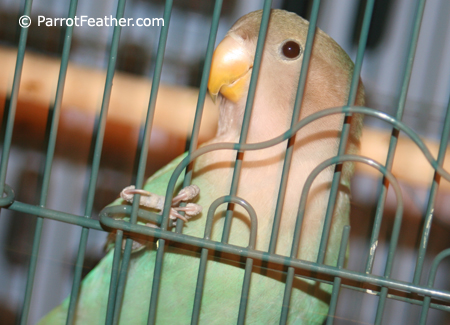Lovebird Problems

Lovebird Screaming
Lovebirds can scream and make loud obnoxious noises for many reasons. The most important thing to do is ignore screaming, that means eye contact too. Yelling at the bird only reinforces this negative trait, so take caution how you deal with the situation.
Walk out of the room: If your bird is handfed and is screaming to get your attention, walk out of the room and wait until it has stopped. Once the bird is quiet, walk into the room and praise him for being quiet. This works wonders and you will be surprised at how quickly they start to minimize screaming. This takes patience and time.
Cover the cage: Another way to address this issue is by putting a cover over the cage when the bird begins to scream continually. Birds do not like being separated from everything. Covering them calms them down for the moment.
*Remember, this is a great technique just don’t abuse it. Keeping your bird covered all day long is unhealthy for him and can cause further issues. Only apply this technique if absolutely necessary and make sure you do not keep them covered for too long, it is mentally unhealthy for the bird to be covered all day long. A way to apply this is to cover them for up to 5 minutes no more than 4 times a day. That way the bird gets the idea that he is being covered because his behavior is not favorable, not because it’s nap time.
It should be noted that all parrots are vocal by nature. Birds are most vocal in the early morning, afternoon, and early evening. You will be able to distinguish intolerable screaming from normal bird sounds and calls. Pay attention to your bird, sometimes they scream at you for a reason and not because they have a screaming problem. If your bird is all of a sudden screaming, something may be scaring him; he may be hungry or even too cold or hot. If your bird is screaming a good amount of the time he is up, then it is generally safe to say that he may have a screaming problem. Apply the above techniques to help lessen his screaming.
Lovebird Chewing
Chewing is very natural for all parrots. Just about anything they can
get their beaks on, they will chew. Just be sure to remove anything you
do not want destroyed. A lovebird’s beak is very powerful and can do
serious damage to wood or decorations. The key here is to supervise your
parrot.
Also, to help minimize the urge to constantly chew, place chewable toys
inside the cage. Add paper sacks or paper into the cage. Your lovebird
will thank you for it and chew less when he is out with you.
Always make sure that what your bird chews is not toxic! Be aware of
what your bird is playing with. For example, some household plants can
be poisonous and dangerous to lovebirds. If you know they are going to
chew on it, put it in a safe place where they cannot get to it. Also
keep wires and other electrical devices away from them. A good example
would be remote controls or children’s toys. They can easily do damage
to the device or get shocked.
Lovebird Plucking
Plucking is a serious problem and can be caused by many things. These
things include psychological problems or physical problems.
Psychological problems include depression, loneliness, and boredom.
Physical problems can range from parasites, skin irritations, or
infections. Whatever your suspicions are, you need to take the bird to a
veterinarian as soon as possible. Everything and anything needs to be
ruled out. Once the problem can be identified, then an answer can be
found. The key is patience and persistence. There are many reasons why
birds pluck; however, some causes are unknown. Birds are very social
creatures and require a balance of human interaction and independence.
Parrots are very intelligent animals and require many types of
stimulants. If they lack these, plucking is possible and most likely
will occur. Never get a bird because they look cute or simply for
amusement purposes. A good rule of thumb with birds is, if you know you
do not have enough time to socially interact with them, get a second
one. Having another bird keeps your existing parrot from being board and
allows him social interaction with another. The downside to this is that
training and taming can be much harder to accomplish. Having another
bird will change the bird’s focus.
Keep in mind that adding another bird might not be the proper solution
if you want your bird to stop plucking. Another way to occupy your
lovebird is by turning on the radio or TV very low so your bird can hear
music and sounds. Never put anything to loud, as it will scare them. You
can spend time with your bird throughout the day.
Incorporating your parrot throughout the day is highly advisable. A
parrot owner doesn’t have to sit down for hours with their bird
everyday. When you have 10 minutes here and there you can take him out
of his cage play
with him and put him back. This is good for your pet because he won’t
get use to a scheduled playtime and be disappointed when you cannot play
with him for long periods of time. It is up to you how many times a day
and for how long you want to spend with your bird. However, the more
time you put into your bird, the better results you will have with him.
These are just some things a pet owner can do to help remove loneliness,
boredom, and unwanted behaviors from their lovebird.




